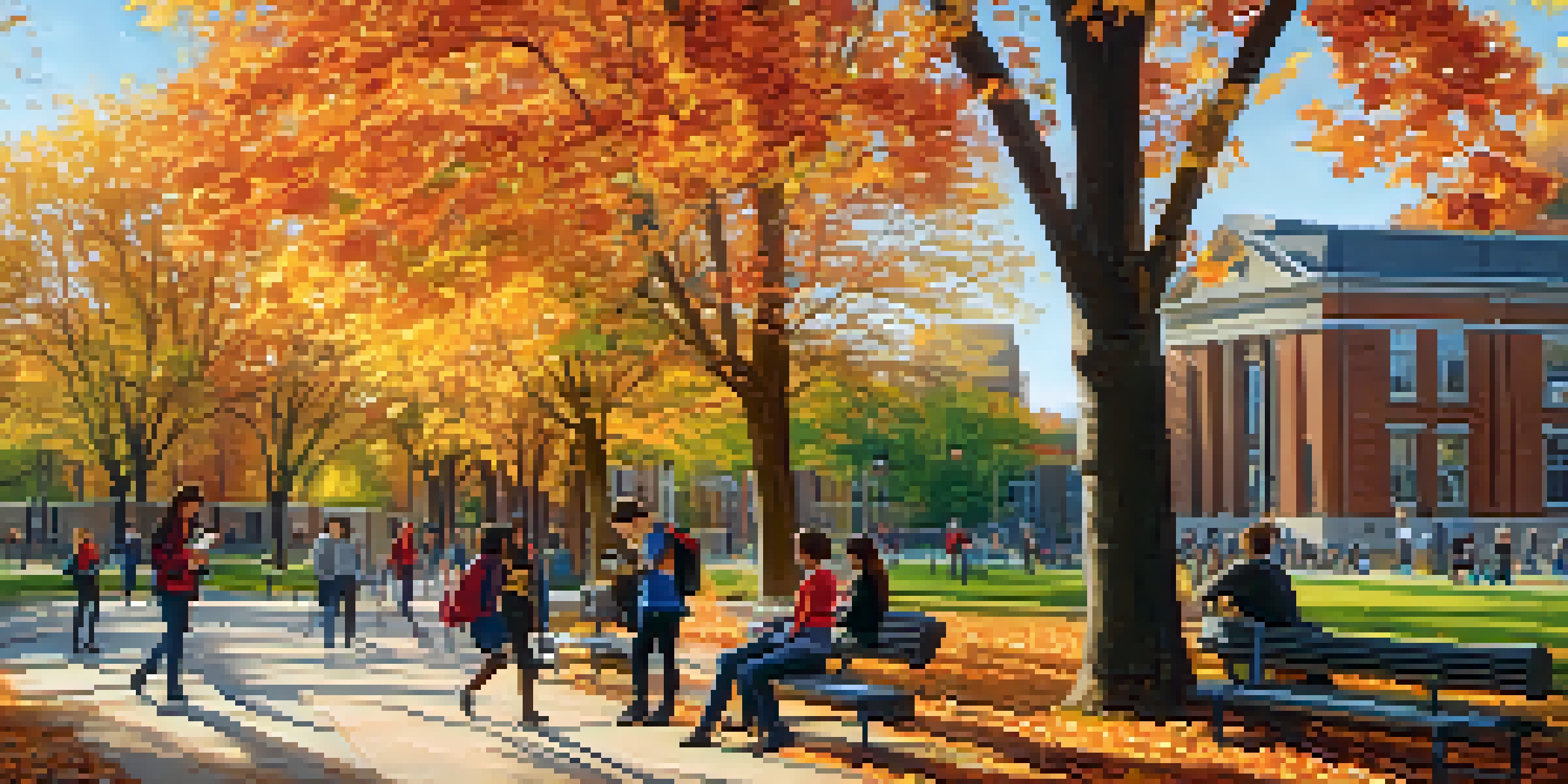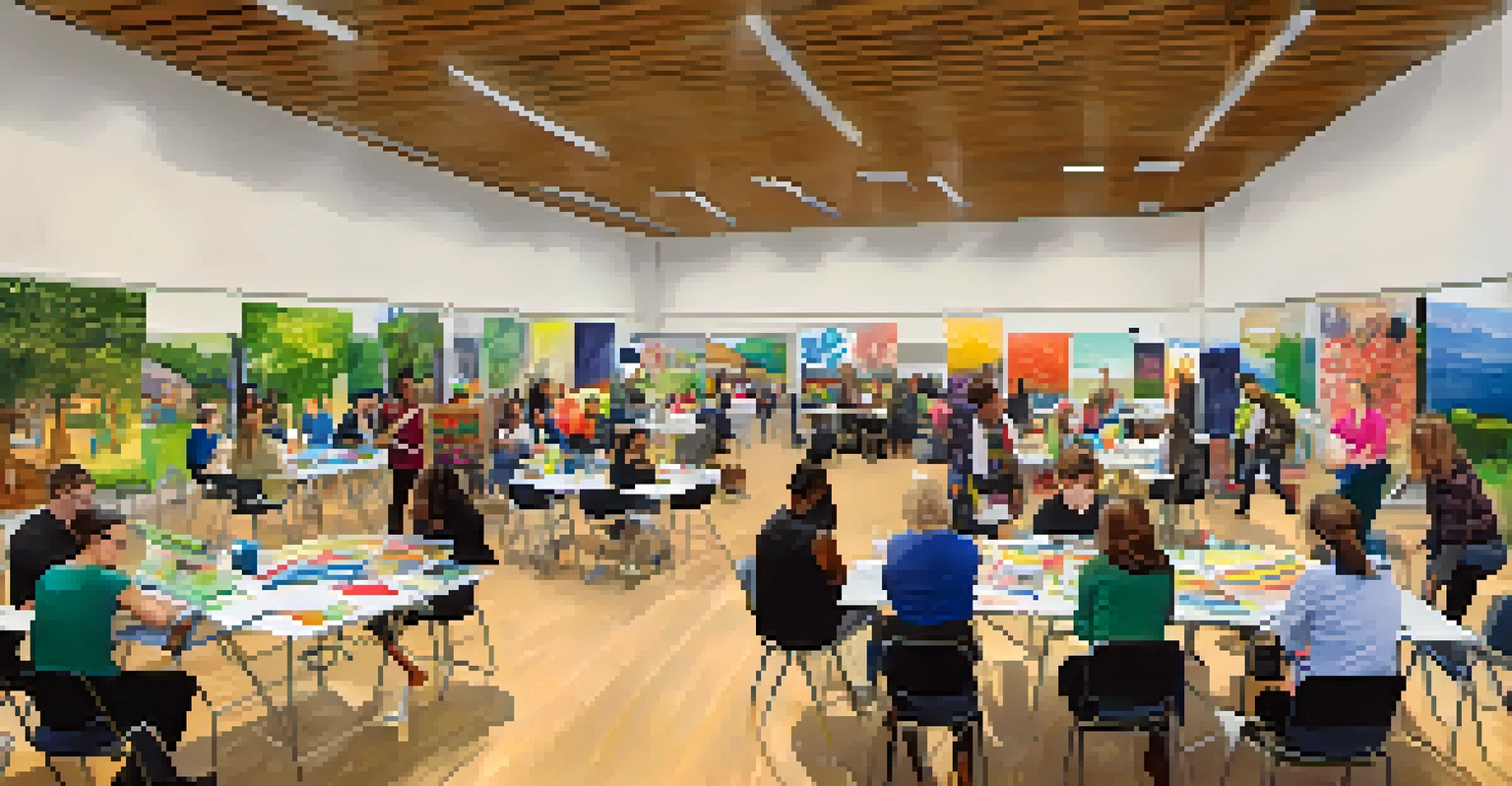Impact of Higher Education on Rochester's Economic Landscape

Overview of Higher Education in Rochester
Rochester, New York, boasts a rich tapestry of higher education institutions, including renowned universities and colleges. This vibrant educational ecosystem nurtures a diverse range of academic disciplines, from engineering to the arts. The presence of these institutions attracts students not just locally, but from across the globe, fostering a melting pot of ideas and cultures.
Education is the most powerful weapon which you can use to change the world.
With schools like the University of Rochester and Rochester Institute of Technology leading the charge, the city has positioned itself as an academic hub. These institutions are not just centers of learning but also catalysts for innovation, research, and community engagement. This dynamic environment enhances the city’s appeal, making it an attractive destination for both students and businesses.
As these institutions grow, so does their impact on the local economy. They contribute significantly to job creation, infrastructure development, and the overall economic vitality of the region. Understanding this relationship is essential for grasping how higher education influences Rochester's broader economic landscape.
Economic Contributions of Local Colleges and Universities
Higher education institutions in Rochester contribute billions to the local economy annually. These contributions come from tuition, staff salaries, and spending by students and visitors, creating a ripple effect throughout various sectors. For instance, local businesses, such as restaurants and retailers, benefit immensely from the influx of students and faculty members.

Moreover, universities often engage in research projects that lead to new technologies and startups, further bolstering economic activity. For example, collaborations between educational institutions and local industries can lead to job creation and innovation. This symbiotic relationship enhances the city’s competitiveness in attracting talent and investment.
Higher Education Boosts Local Economy
Rochester's colleges and universities contribute billions to the local economy through tuition, job creation, and student spending.
In addition to direct financial contributions, these institutions also play a key role in workforce development. By offering specialized programs and degrees tailored to market needs, they ensure a skilled workforce ready to fill gaps in various industries. This alignment between education and employment is crucial for sustaining Rochester's economic growth.
The Role of Research and Innovation
Research and innovation are at the heart of higher education's impact on Rochester's economy. Universities in the region are involved in groundbreaking research that drives technological advancements and creative solutions. This not only enhances the academic reputation of these institutions but also fosters economic development.
An investment in knowledge pays the best interest.
For example, research initiatives often lead to patents and spin-off companies, contributing to job creation and attracting funding. The synergy between academia and industry is crucial; it allows for the practical application of research findings in real-world settings. This collaboration fuels innovation, making Rochester a center for emerging technologies.
Furthermore, the entrepreneurial spirit nurtured in these institutions encourages students and faculty alike to develop their ideas into viable businesses. This culture of innovation not only enriches the local economy but also positions Rochester as a leader in various fields, from healthcare to engineering.
Attracting Talent and Retaining Graduates
Rochester's higher education institutions play a pivotal role in attracting talent from across the nation and beyond. The diverse programs offered draw in students with varied interests and ambitions, enriching the local talent pool. This influx of young professionals is vital for the city’s growth, as they bring fresh perspectives and energy.
However, attracting talent is just one part of the equation; retaining graduates is equally crucial. Many institutions are implementing strategies to keep graduates in the area after they complete their studies. This includes job placement programs, networking opportunities, and partnerships with local businesses, all aimed at creating a seamless transition from education to employment.
Research Drives Innovation and Jobs
Groundbreaking research at local institutions leads to technological advancements and the creation of startups, further enhancing economic activity.
When graduates stay in Rochester, they contribute to the local economy by filling essential roles in various sectors. The presence of a skilled workforce not only supports existing businesses but also attracts new companies looking to tap into this rich talent pool. This cycle of attraction and retention is key to sustaining Rochester's economic vitality.
Community Engagement and Social Development
Higher education institutions in Rochester are deeply engaged in their communities, fostering social development alongside economic growth. Many universities actively participate in outreach programs that address local challenges, from education to public health. This commitment to community service not only enhances the quality of life but also strengthens the bond between institutions and residents.
Through partnerships with local organizations, colleges and universities are able to implement initiatives that benefit the community. These programs often involve students, providing them with valuable real-world experience while addressing pressing social issues. This hands-on approach cultivates a sense of responsibility and civic engagement among students.
Moreover, the cultural events, workshops, and lectures hosted by these institutions enrich the community’s social fabric. They offer residents opportunities to engage with new ideas and perspectives, fostering a vibrant and informed populace. This cultural exchange ultimately contributes to Rochester’s identity as a dynamic and inclusive city.
Challenges Facing Higher Education Institutions
Despite their significant contributions, higher education institutions in Rochester face various challenges that impact their role in the economy. Funding cuts, rising tuition costs, and increased competition for students can strain these institutions. Navigating these challenges requires innovative solutions and a commitment to maintaining quality education.
Additionally, the job market is constantly evolving, which necessitates that educational programs adapt to meet changing demands. Institutions must ensure that their curricula align with industry needs, preparing graduates for the realities of the workforce. This adaptability is crucial for maintaining relevance and competitiveness in the higher education landscape.
Talent Attraction and Retention Strategies
Rochester's higher education institutions focus on attracting and retaining graduates through job placement programs and partnerships with local businesses.
Moreover, the impact of the COVID-19 pandemic has further complicated these challenges, leading to shifts in enrollment patterns and increased reliance on online education. As institutions adapt to these changes, their ability to sustain economic contributions to Rochester will depend on their resilience and commitment to innovation.
Future Outlook for Higher Education in Rochester
Looking ahead, the future of higher education in Rochester appears promising, but it will require ongoing collaboration between institutions, businesses, and the community. As the demand for skilled workers continues to rise, educational institutions must evolve to meet these needs. This evolution may involve expanding programs in technology, healthcare, and other high-demand fields.
Additionally, fostering partnerships with local industries will be vital in creating internships and job placement opportunities for students. Such collaborations not only enhance the educational experience but also ensure that graduates are well-equipped for the workforce. This interconnectedness will strengthen Rochester’s economic landscape and support its growth.

Ultimately, the success of higher education in Rochester hinges on its ability to adapt and innovate. By embracing change and prioritizing community engagement, institutions can continue to play a vital role in shaping the city’s economic future, ensuring a vibrant and thriving community for years to come.